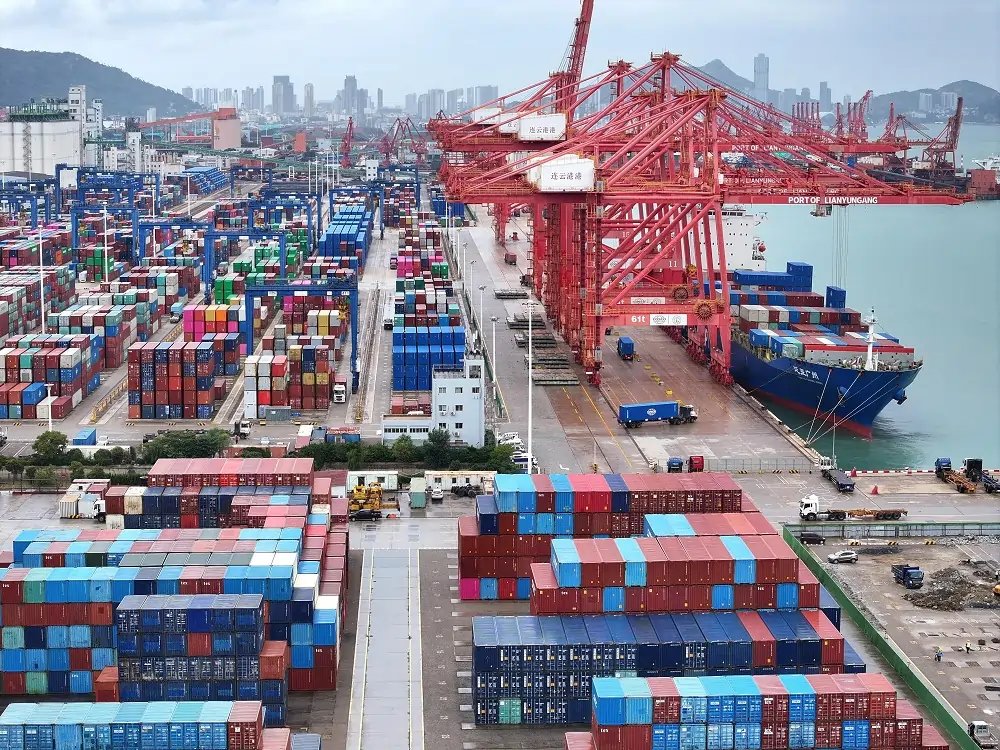China revises up 2023 GDP, sees little impact on 2024 growth
Published by Jessica Weisman-Pitts
Posted on December 26, 2024
3 min readLast updated: January 27, 2026

Published by Jessica Weisman-Pitts
Posted on December 26, 2024
3 min readLast updated: January 27, 2026

By Kevin Yao and Ellen Zhang
BEIJING (Reuters) – China revised upwards on Thursday the size of its economy by 2.7%, but said the change would have little impact on growth this year, as policymakers pledged more stimulus to spur expansion in 2025.
Policy support late this year has set the world’s second-largest economy on track for a growth target of “around 5%” as activity warmed slightly, but challenges such as potential U.S. tariff hikes still weigh on prospects for next year.
Gross domestic product (GDP) in 2023 was raised by 3.4 trillion yuan to 129.4 trillion ($17.73 trillion), Kang Yi, the head of the National Bureau of Statistics, told a presss conference, while releasing the fifth national economic census.
He did not explain the reasons for the 2023 revision, but said the bureau would provide further details on its website within days.
China’s economy has “withstood the test of multiple internal and external risks over the past five years, and maintained a generally stable trend while progressing,” Kang said.
In previous five-yearly economic censuses, China revised up the size of the economy for 2018 by 2.1% and for 2013 by 3.4%.
The fifth economic census carried out over the past five years encompassed the three years of the COVID-19 pandemic, which had a significant impact on the economy, Kang added.
The international environment had witnessed “profound and complex changes” since the previous such census, he said.
The revision of 2023 GDP would not have a significant impact on China’s 2024 GDP growth rate, Lin Tao, the bureau’s deputy head, told the same briefing, however.
On Thursday, the World Bank raised its forecast for China’s economic growth in 2024 and 2025, but warned that subdued household and business confidence, along with headwinds in the property sector, would keep weighing it down next year.
UPHILL BATTLE AHEAD
The economic census will provide important data to help formulate tasks for China’s 15th five-year plan from 2026 to 2030, and help achieve its 2035 goals, Kang said, without elaborating.
President Xi Jinping’s vision of “Chinese-style modernisation” envisages doubling the size of the economy by 2035 from its 2020 level.
Government economists estimate that would require average annual growth of 4.7%, a target many analysts outside China consider overly ambitious.
At an agenda-setting meeting this month, Chinese leaders pledged to increase the budget deficit, issue more debt and loosen monetary policy to support economic growth next year in expectation of more trade tensions with the U.S. when President-elect Donald Trump takes office in January.
Last week Reuters reported that the leaders agreed to raise the budget deficit to 4% of gross domestic product next year, its highest on record, while maintaining an economic growth target of around 5%.
The economic census showed the number of business entities in the secondary and tertiary industries at the end of 2023 rose 52.7% from the end of 2018, but growth of employment lagged, at 11.9%.
The economic census showed changes in China’s job market, with 25.6% more people employed in the tertiary industries at the end of 2023 than at the end of 2018, but secondary industries had 4.8% fewer employees.
As a severe property crisis hobbles a macroeconomic rebound, employees of property developers fell 27% to 2.71 million by the end of 2023 against the corresponding 2018 figure, the economic census data showed.
Tertiary industries range from retail to transport, catering, accommodation, finance and property, while secondary industries cover mining, manufacturing, utilities and construction, for example.
($1=7.2992 Chinese yuan)
(Reporting by Kevin Yao and Ellen Zhang; Editing by Himani Sarkar and Clarence Fernandez)
Economic growth refers to the increase in the production of goods and services in an economy over a period of time, typically measured as the percentage increase in GDP.
Financial stability refers to a condition in which the financial system operates effectively, with institutions able to manage risks and absorb shocks without significant disruption to the economy.
Explore more articles in the Finance category
